Dermatologist-Approved Sunscreens for Kids
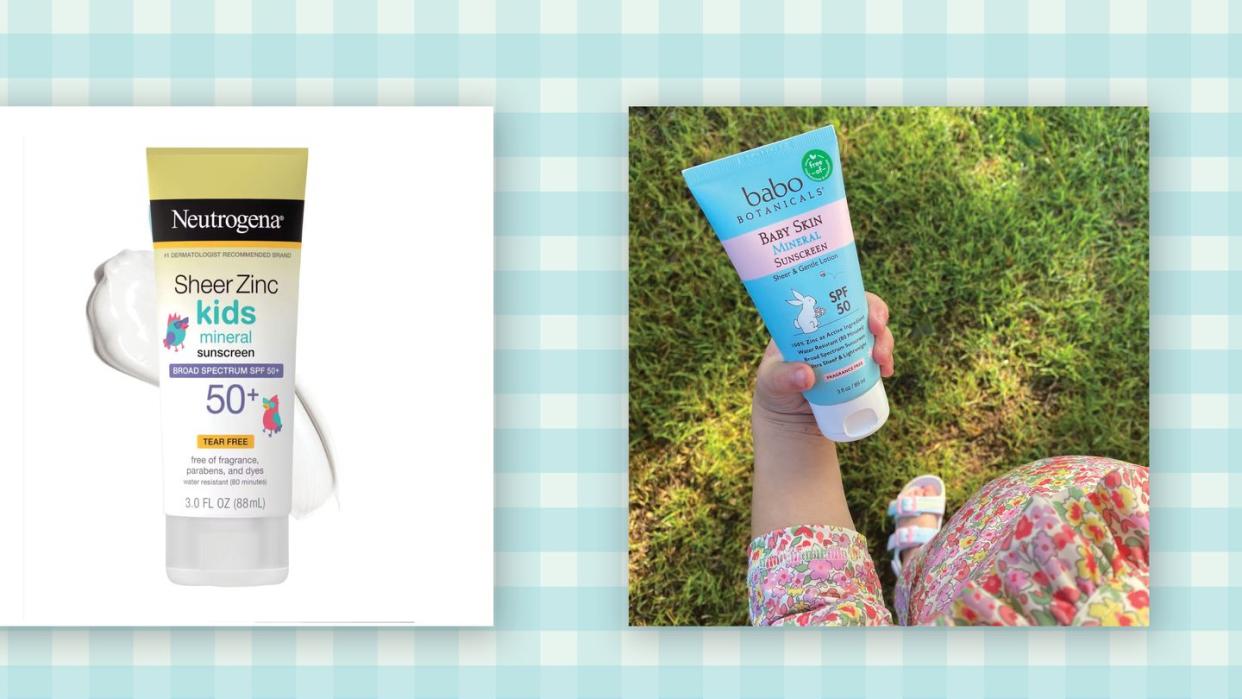
"Hearst Magazines and Yahoo may earn commission or revenue on some items through these links."
It's a hot summer day, and all that stands between you and the pool is slathering some sunscreen on your kids before they wiggle out of your arms. Should be easy, right? Not so much. You have to navigate the hundreds of options and different ingredient lists to find the best sunscreen for kids. To make a difficult task even harder, you have to consider kids’ sensitive skin and how they will react differently to certain ingredients.
"Any sunscreen is better than no sunscreen," says Dr. Sheilagh Maguiness, MD, pediatric dermatologist at M Health Fairview Pediatric Specialty Clinic and president of the Society for Pediatric Dermatology. "I tell parents to take the guess work out and stick to mineral sunscreens," says Dr. Maguiness.
When selecting a sunscreen, Birmingham-based board certified dermatologist Dr. Corey Hartman also suggests looking for a "broad-spectrum SPF 30-50 that doesn’t irritate your skin" and reapplying every two hours while outside, or every 40-80 minutes if you're sweating or in the water.
Broadly, there are two types of sunscreen approved for sale in the US:
Mineral (or physical) sunscreen: Works by deflecting the sun's rays so your skin doesn't absorb them. Mineral sunscreens typically include zinc oxide or titanium dioxide as the active ingredient.
Chemical sunscreen: Works by absorbing the sun's rays and can contain one or more active ingredient. Chemical sunscreen labels will include active ingredients such as as avobenzone, oxybenzone, octocrylene, homosalate, octisalate and octinoxate.
Dr. Maguiness recommends flipping over your sunscreen and reading the what's listed under "active ingredients." If it's a true mineral sunscreen only zinc oxide or titanium dioxide will be listed.
"I prefer lotion when purchasing a sunscreen," says Dr. Mona Amin, DO, board-certified pediatrician, mom of two, and host of the parenting podcast PedsDocTalk. "If using spray sunscreen, make sure you apply outdoors to limit inhalation," says Dr. Amin.
In addition to protecting from painful burns, Dr. Hartman warns that the beginning of skin cancer, photo damage, and sun spots are all planted when you’re a child. “Eighty percent of your lifetime sun exposure is before the age of 18,” notes Dr. Hartman. Encouraging sunscreen application ensures that it becomes a habit at a young age.
Along with advice from our panel of expert dermatologists, we’ve selected the best sunscreens for kids to help them stay sun-protected this summer, including options for sensitive skin and a genius trick for the wiggliest kid in your crew.
Childhood pastimes worth slathering on SPF for: Creative Scavenger Hunt Ideas for Kids and Families | Outdoor Games for Kids to Play All Summer | Our All-Time Favorite Recipes for a Perfect Picnic
Baby Skin Mineral Sunscreen Lotion
Babo Botanicals is our overall winner, and my personal favorite for my two wiggly sun-loving daughters. It ticks all the non-negotiable boxes with an SPF 50, water-resistant formula and mineral ingredients, but the formula is the real star. It’s silky smooth and doesn’t leave a white cast that is so common with mineral products. I reach for it every time and recommend it highly.
Review: "This product goes on smooth and does a great job at protecting from harmful UVA and UVB rays. I love knowing the ingredients are safe to use on my babies."
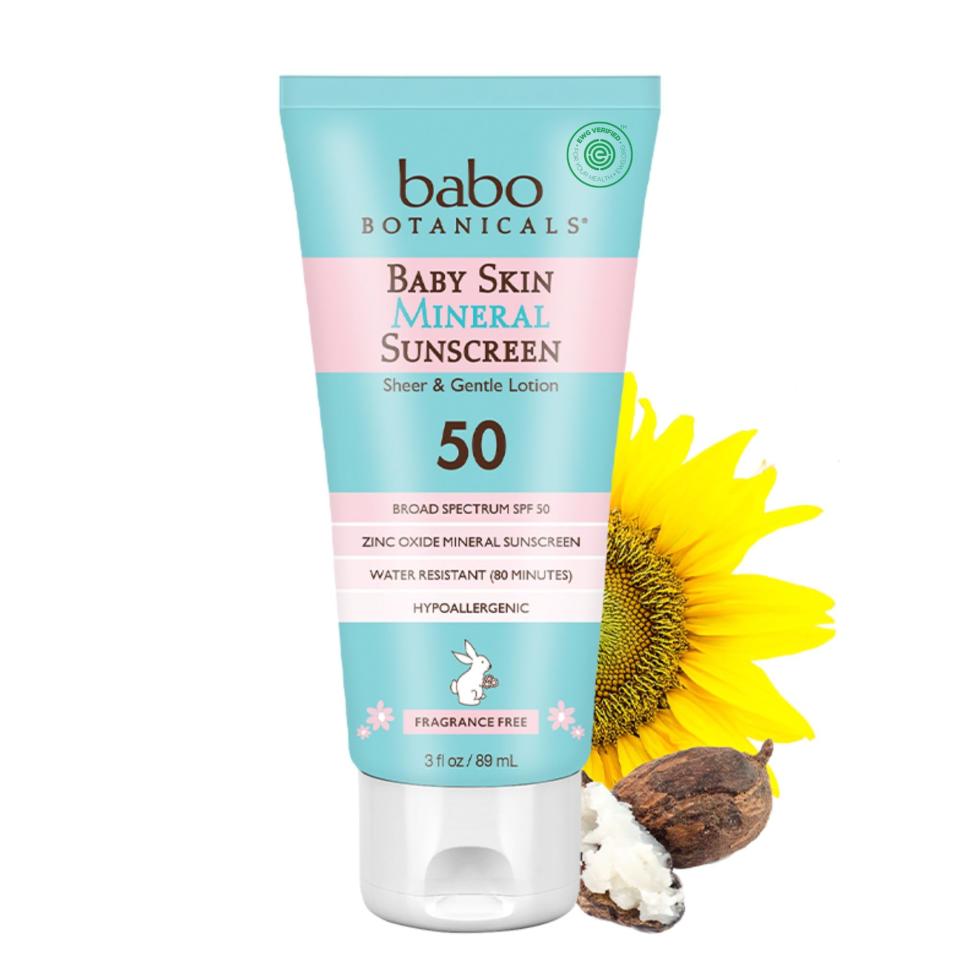
transparent Zinc Oxide Kids Mineral Sunscreen Lotion
This gentle formula from skincare giant Neutrogena is an affordable option for a mineral sunscreen that’s fuss-free, easy to apply and is white upon application (to help you achieve an even coverage) but dries transparent.
Review: "I have tried at least 10 different sunscreens for my toddlers. This sunscreen does not irritate their eyes or their skin. Highly recommended."
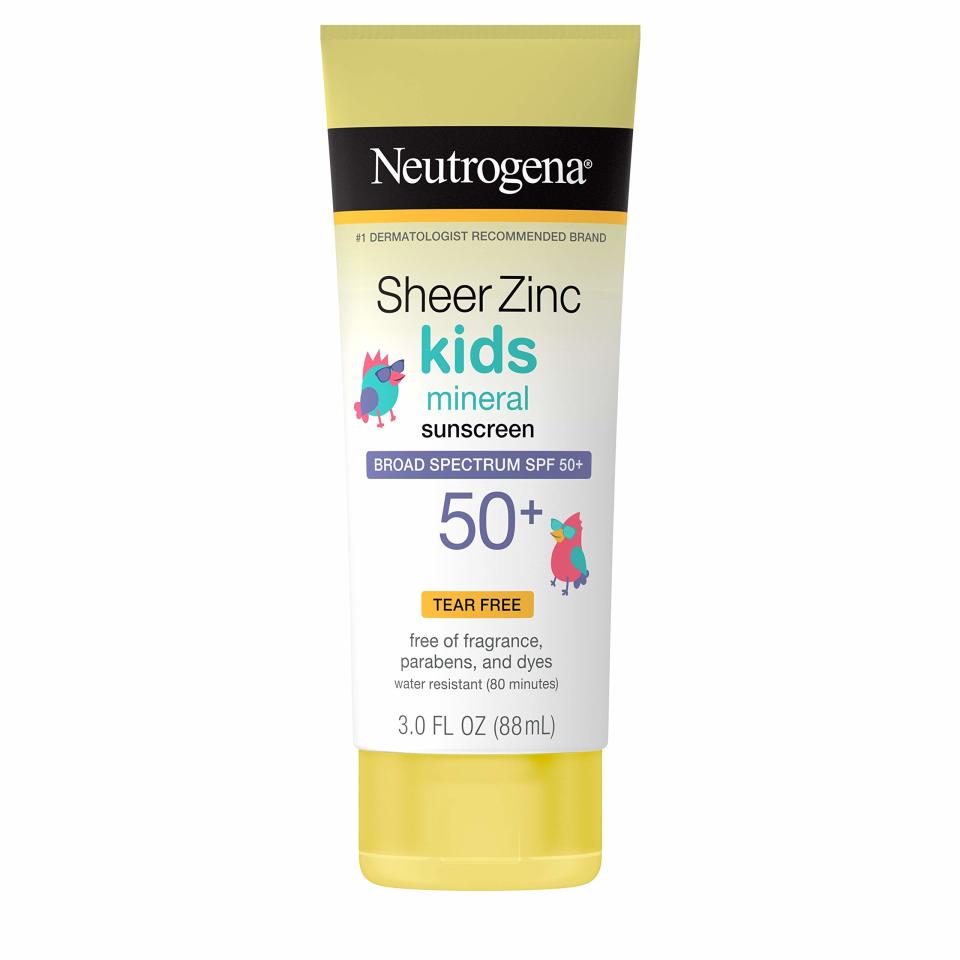
Sensitive Mineral Sunscreen with Zinc Oxide
This Australian brand is a favorite of pediatricians and dermatologists, and is widely recommended for kids with sensitive skin. My eczema-prone daughter has used it for years with no irritation thanks to its paraben and fragrance free mineral-based formula. Dr. Hartman likes that the bottle utilizes a technology that makes it change color in the presence of harmful UV light. A helpful reminder to reapply.
Review: "This sunscreen is one of the only ones my daughter and I can use that is not irritating. It provides full coverage and stays on for a pretty long time before additional applications are needed. We have used this for years."
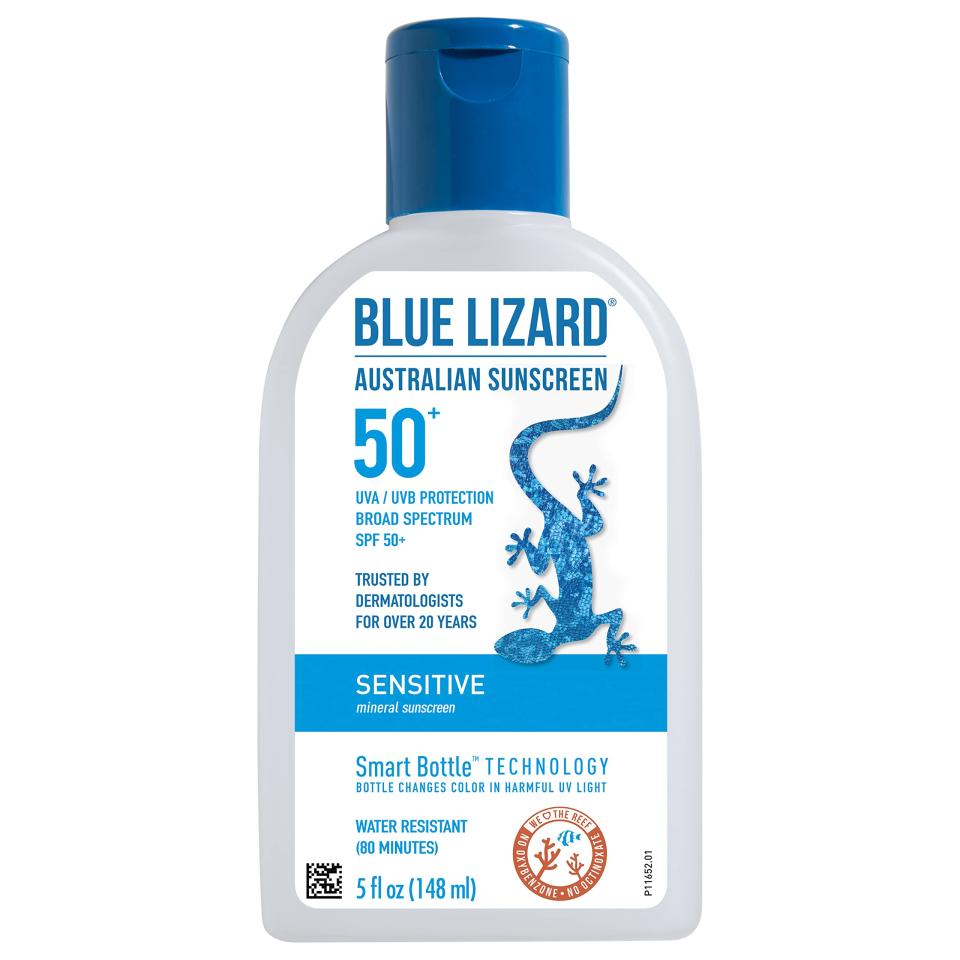
Mineral Sunscreen Lotion SPF 50
With Mustella's well-known reputation as a skincare brand it's no surprise their sunscreen offering is approved by the National Eczema Association. This mineral sunscreen is great for kids with sensitive skin thanks to it's fragrance-free and paraben-free formula.
Review: "This is the first sunblock I have found that did not break my daughters face out. My daughter has super sensitive skin and eczema, I have tried many different brands of sunblock, spent lots of money and each time she would break out on one side of her face. Wish I would have found this sooner!
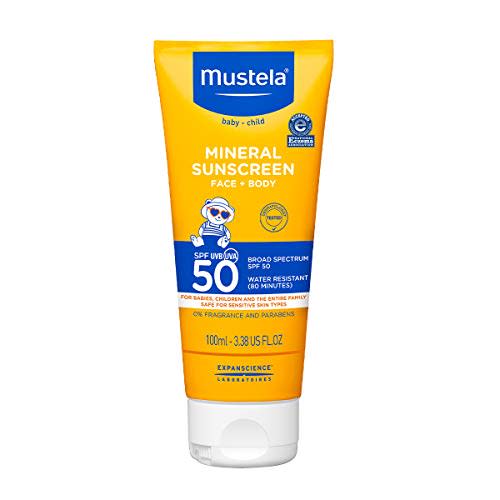
Kids Mineral Sunscreen
Think, a favorite of Dr. Maguiness, offers a kids sport sunscreen that's perfect for active summer days because its smooth formula goes on like a moisturizer. Thanks to the mineral formula, it protects immediately upon application (unlike chemical offerings).
Review: "I love this sunscreen for my child. It goes on very thick and takes a few minutes to rub into the skin, but my child never gets a sunburn while this is on even if he’s in and out of the pool or the water at the beach."
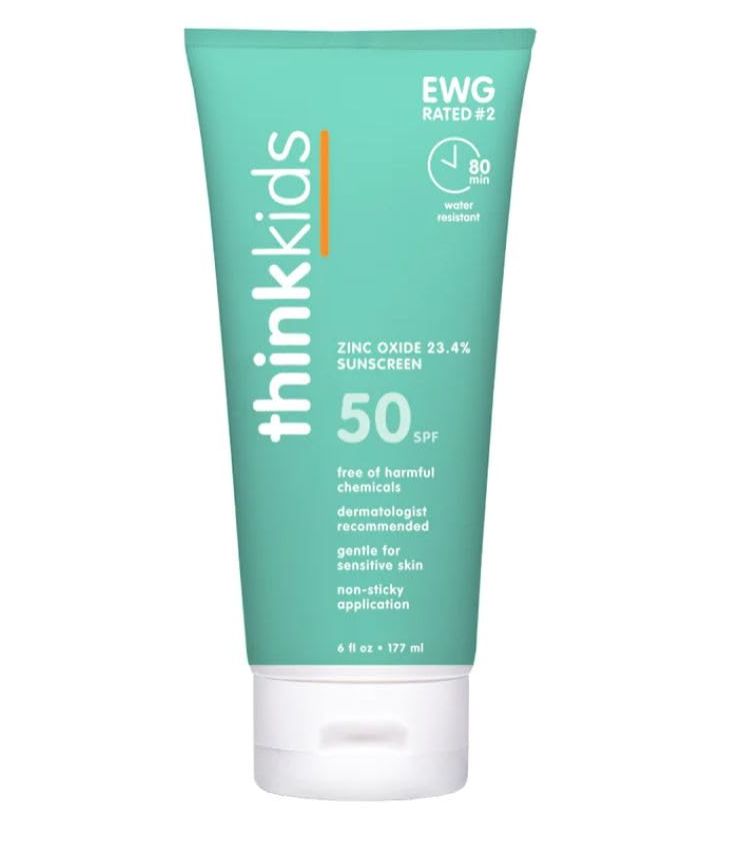
Sunscreen Face Stick
The older kids get, the more they like to do things themselves. With a sunscreen stick like this one, they can easily apply it on their own to their face (with your supervision, of course). This formula also features vitamin E, which can "reduce UV-induced skin swelling, skin thickness, erythema, and edema — all signs of skin inflammation," per Oregon State University.
Review: "Absolutely love this sun stick! I have purchased a several different kinds of sunblock for my 5 year old son. Most leave the white residue and I have to usually use my hand to spread out the white residue on his face but this one is clear so he can just apply it by himself which makes it easier for me!"
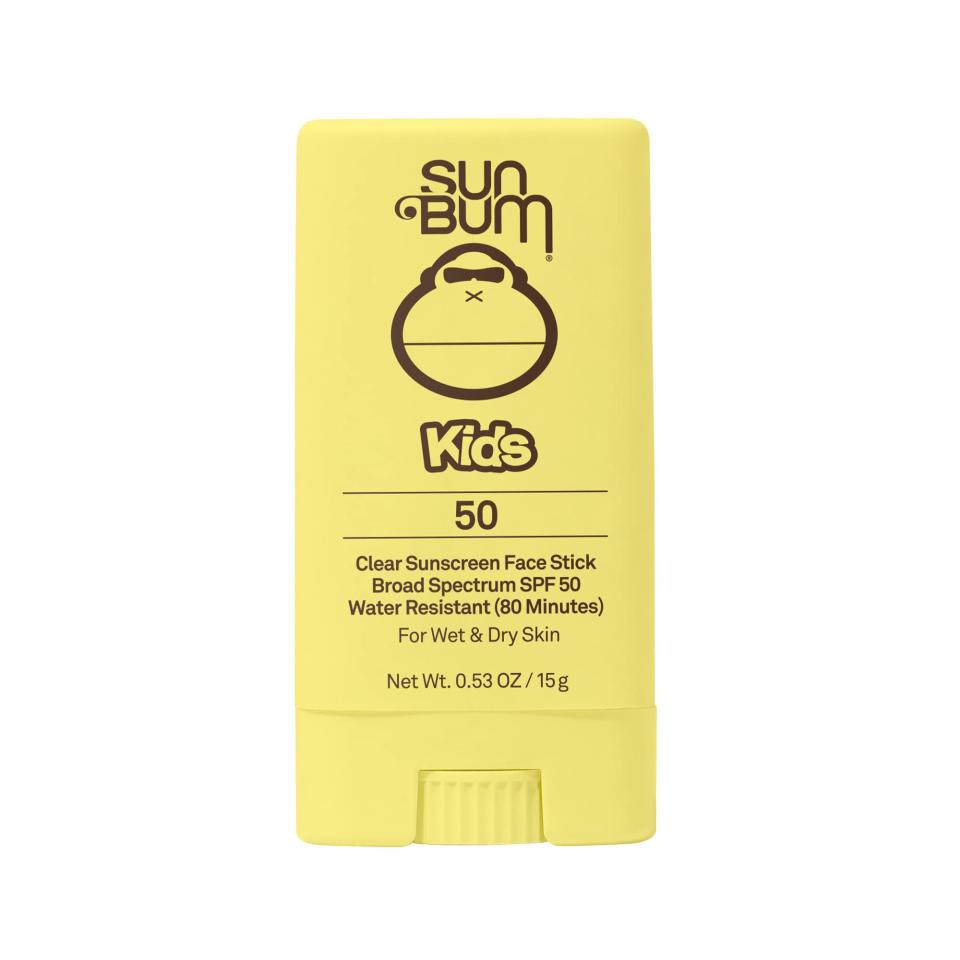
Broad Spectrum Sunscreen Lotion (x2)
The biggest reason kids can be averse to using sunscreen is because if it gets in their eyes, it burns! Luckily, Banana Boat has a formula that claims to be "tear-free." And reviewers on Amazon agree that it actually works. Some reviewers note that although it has a white cast when you first apply it, it quickly goes away.
Review: "Absolute best for sun protection for my kids! I also use these when I see that I am burning because this sunscreen is very thick and repels water very very well."
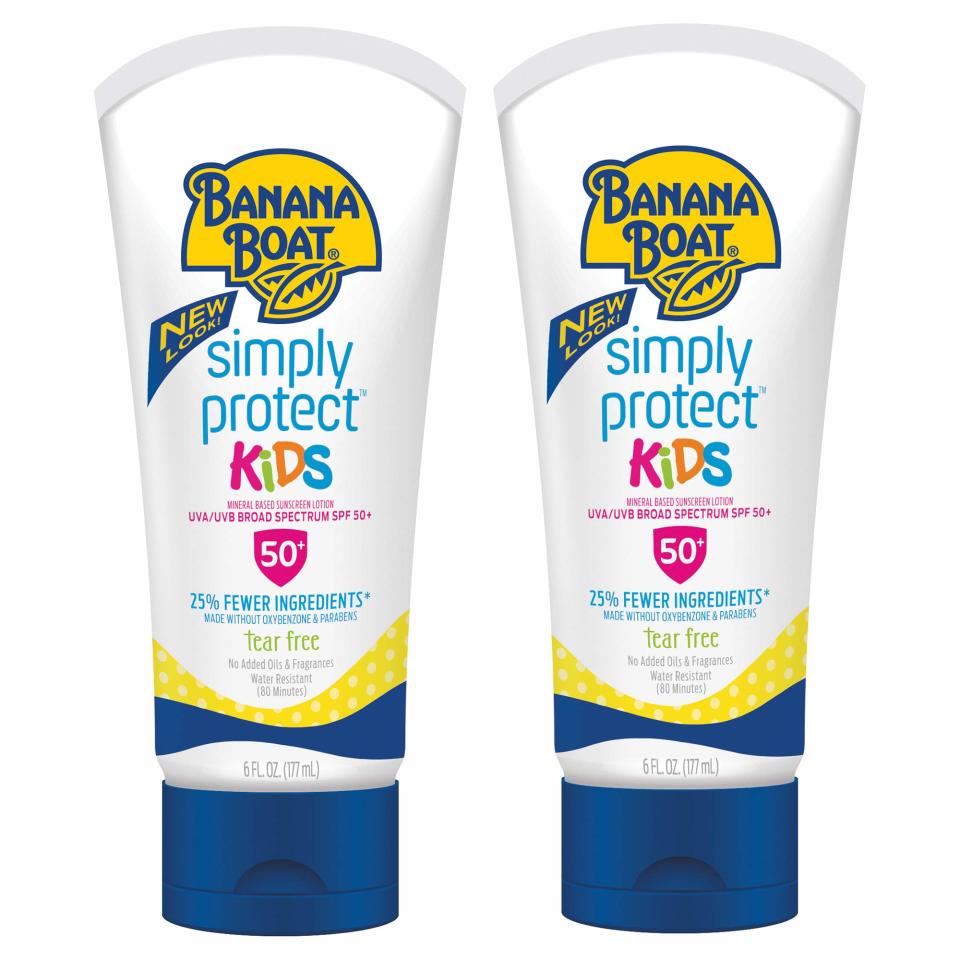
Anthelios Kids Gentle Lotion Sunscreen
We’ve all been there–the dreaded exfoliation cocktail created by trying to reapply sunscreen onto wiggly, sandy skin. Not anymore, my friends! The texture of this sunscreen is magic. It’s lightweight and incredibly easy to rub into the skin, and most importantly it’s not sticky, making your kids skin practically sand resistant.
Review: "This sunscreen rubs in easily, has no scent, and is sensitive for my kids but tough enough to prevent burns!"
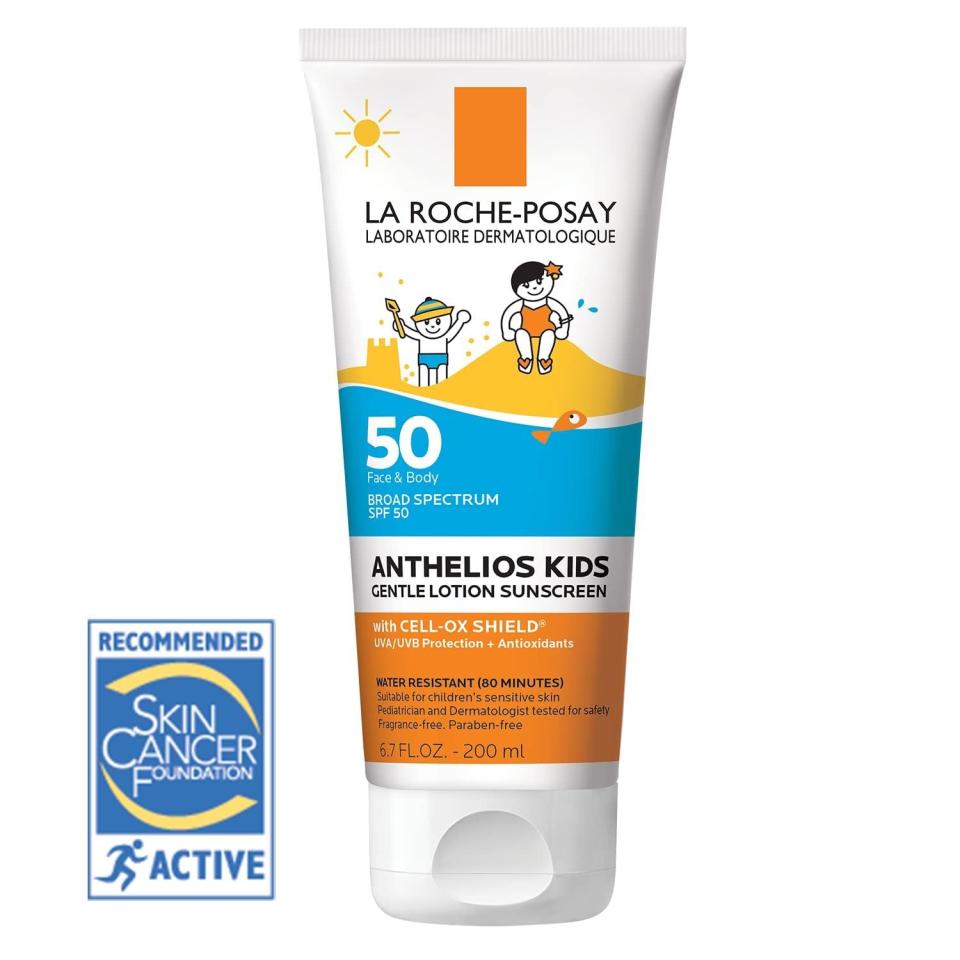
Kids Mineral Sunscreen Cream
Made from 98% organic ingredients, Badger’s mineral sunscreen is a parent-favorite. Zinc oxide provides sun protection while jojoba seed oil, beeswax and vitamin E provide hydration. Added bonus, it’s reef-safe and water-resistant making it great for trips to the beach. The tangerine and vanilla scent is subtle but may not be for everyone.
Review: "We wanted to move to a mineral based sunscreen but our kid was complaining that they all smelled awful. Finally found this one and she loves it. "
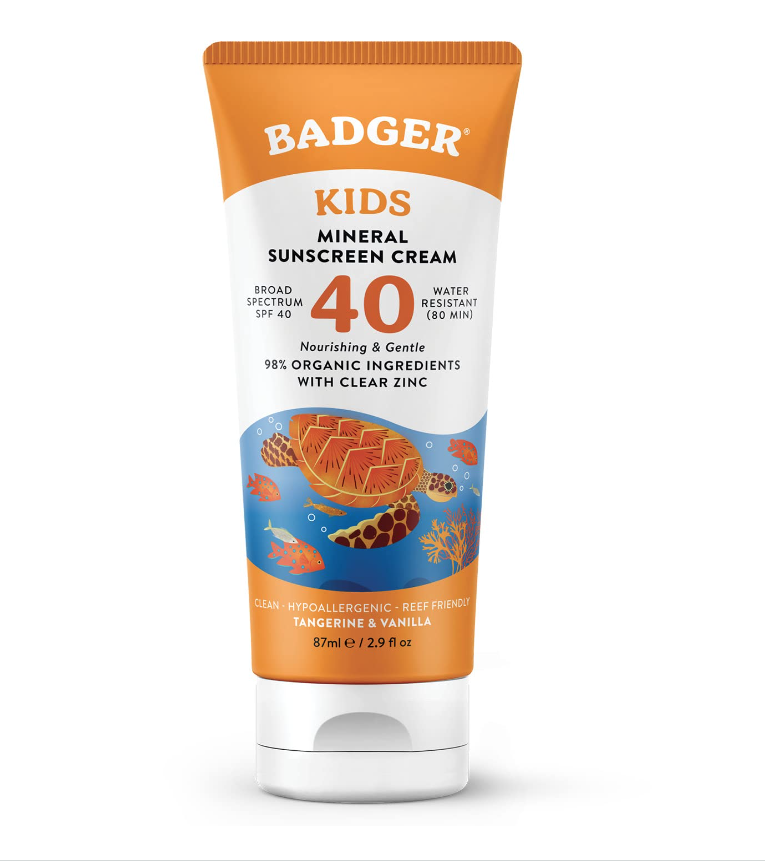
SPF 50 Mineral Baby Sunscreen Spray
We’ve all been burned, quite literally, by aerosol sunscreens that are famous for missing hard to reach spots (and aren’t safe for kids to inhale). Thanks to Baby Organics classic pump style bottle, you get the ease of application without the potential for user error. Like all of our favorite sunscreens, it utilizes zinc oxide as its active ingredient, is SPF 50+ and stays water-resistant for up to 80 minutes.
Review: "This is my favorite brand of children's sunscreen. It goes on well and has a nice scent. The pump is easy to use and it never irritates my child's skin. I would highly recommend it."
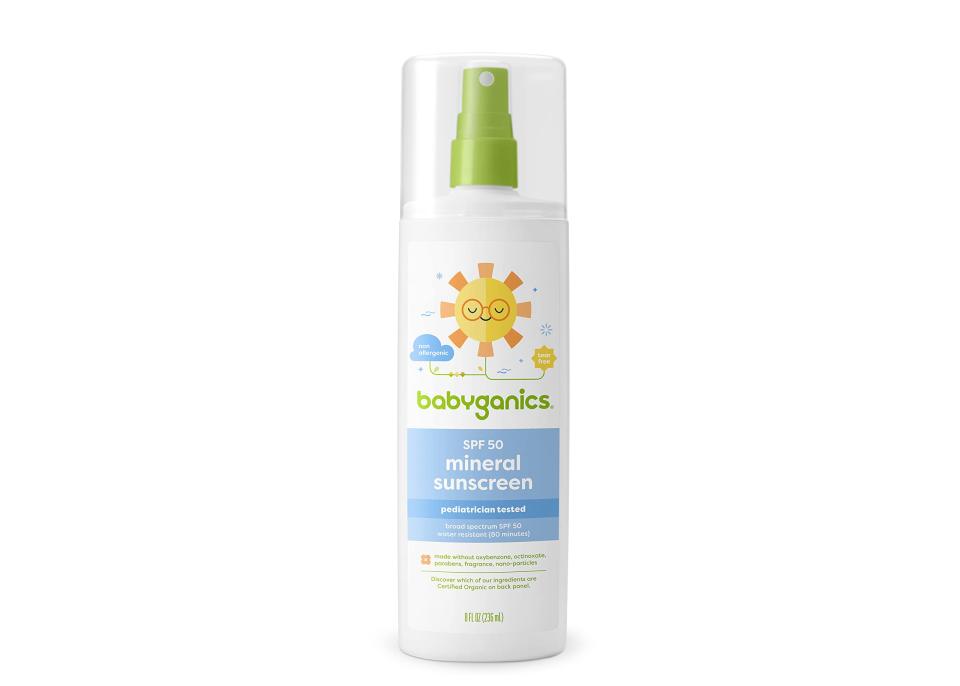
Sunscreen Broad Spectrum SPF 50+
While not specifically formulated for kids, Dr. Hartman likes Vanicream because "it’s great for sensitive skin because it doesn’t burn or sting.”
Review: "My son has a terrible allergy to a chemical in most sunscreens that results in a blistering chemical burn. This was the sunscreen recommended by his pediatric dermatologist. It’s fantastic. Most of the family uses it now."
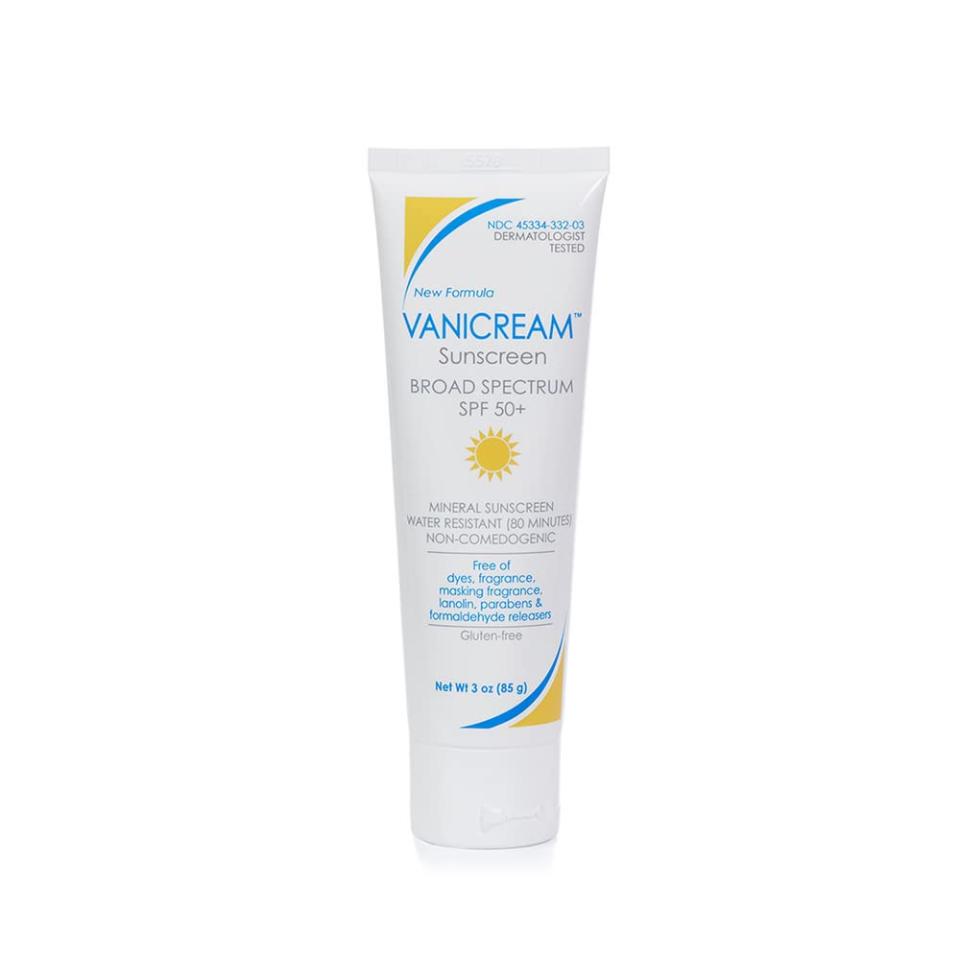
Kids Broad Spectrum Sunscreen
Shontay Lundy, founder of the brand, had the mission to create sunscreen formulated specifically for women of color. Since then, her band has expanded to include a kids' line. Made with moisturizing ingredients, such as shea butter, avocado and sunflower seed oil, it's perfect if your child is prone to dry skin.
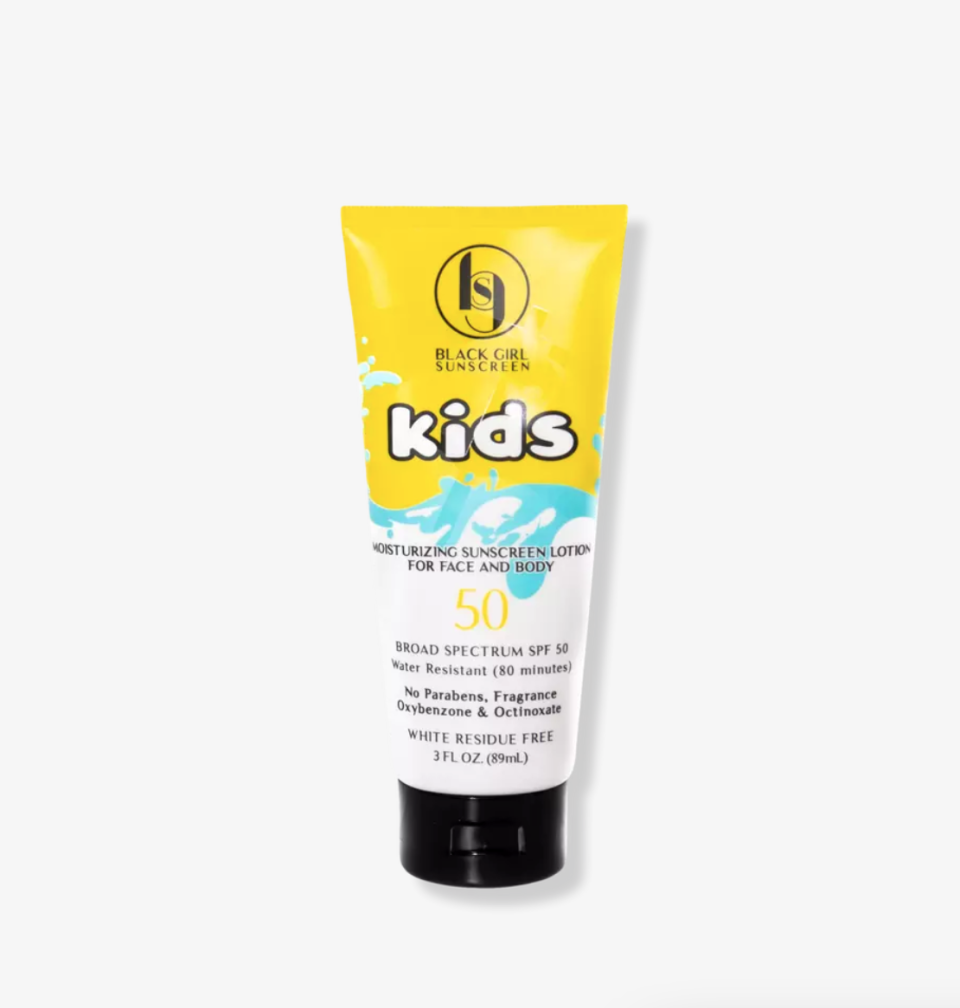
What should I look for when I shop for sunscreen for kids?
Mineral actives: Dr. Hartman prefers mineral sunscreen for kids' sensitive skin. Mineral sunscreens, which contain physical sun-blockers like zinc oxide or titanium dioxide, are gentle on kids’ sensitive skin while still providing the broadest protection against UVA and UVB rays. Experts widely agree that mineral ingredients are safe and effective.
SPF: The American Academy of Dermatology recommends an SPF of 30 or higher, but Dr. Maguiness encourages going the extra mile for an SPF 50, especially for kids under 2.
Broad spectrum: Sunscreen labeled "broad spectrum" means that it will protect your skin from both UVA and UVB rays, helping you avoid both skin cancer, early aging (think wrinkles and sun spots) and burning.
Water-resistant: Reapplication is always important, especially if kids are playing at the beach or pool. No sunscreen is waterproof, but some are water-resistant and can stay on the skin for up to 80 minutes. Most sunscreens for kids are water-resistant, but make sure to check the label.
Fragrance Free: "Look for formulas that are both fragrance free and hypoallergenic," says Dr. Maguiness who adds that these formulas are best for limiting irritation.

What type of sunscreen is best for kids?
Dr. Maguiness advises sticking to lotions or sticks and avoiding sprays. "If it's in a aerosol spray it's likely a chemical sunscreen," she says. "It will have chemicals and propellants that you don't want to inhale and you're also not going to get the same coverage."
However, if you prefer the convenience of an aerosol, make sure to spray in a windless area and rub in the sunscreen with your hands after spraying.
Keep in mind that the FDA doesn't regulate the terms "kid" or "baby" on sunscreen, so it's important to read the ingredients.
Thankfully kids don't need special sunscreen, but looking for kid-specific sunscreens (which are often mineral) can help take out some of the guess work in finding options that aren't irritating to sensitive skin and are water-resistant.

How should I apply sunscreen to kids?
Studies have found that people routinely apply less sunscreen than needed for optimal protection. To be safe, liberally apply a layer to exposed skin and don't forget spots like the scalp, ears and the tops of feet.
Lotions provide the most even coverage, especially mineral-based sunscreens that show on the skin before absorbing. Steer clear of aerosol products, which can go on unevenly.
Be aware that mineral sunscreen may leave a white sheen on the skin instead of fully absorbing. Dr. Amin says she isn't bothered by the cast. "Even as a person with darker skin, I personally don’t mind it as it reminds me of summer and is a physical reminder that my son has sunscreen on."
Dr. Maguiness loves seeing creative ways that moms are applying sunscreen that works for them, like makeup brushes and sponges.

How often should you reapply your child's sunscreen?
Dr. Amin encourages parents to apply 15 minutes before going outside when possible. After that initial application, Dr. Hartman recommends reapplying after two hours unless you're in water or sweating. In that case, use a water-resistant sunscreen and check the label for the length of time it can stay on wet skin (either 40 or 80 minutes).

What is the best sunscreen for babies?
The APP recommends keeping newborns and babies under 6 months of age out of direct sunlight.
Dr. Amin acknowledges that families often have outdoor events for an older sibling where staying inside isn't an option. Her best advice in these situations? "Take an umbrella, go underneath a big tree, or create shade for optimal sun protection for our little babies," she says.
Personally, Dr. Maguiness (along with the Society for Pediatric Dermatology) feels comfortable with a zinc oxide sunscreen on babies if sun exposure is unavoidable. She recommends using a mineral sunscreen stick for babies so that you aren't worried about getting lotion into their sensitive eyes.

What are other sun safety tips for kids?
Avoid peak UV hours: "Use the UV index as your guide," suggests Dr. Maguiness. "If the UV index is 3 or more you need full protection. And don’t forget that even on cloudy days the UV index can be very high."
Seek shade: Identify if shaded areas are available and if not, consider bringing umbrellas or outdoor tents to create your own. "If they are seeming listless, tired, or showing signs of exhaustion it’s important to listen to this and move indoors into cooler temperatures," says Dr. Amin.
Consider protective clothing: “Wearing protective clothing like hats and UVF rash guards can help parents focus on those often missed areas like the hairline, back of the neck, tops of the hands and feet and ears,” says Dr. Maguiness.
Keep a close eye: It's also important to monitor your comfort and their comfort. "If you’re too hot, they’re likely hot too," says Dr. Amin. Keep an eye on their behavior and frequently encourage hydration.

Why Trust Country Living?
Your kids deserve the best, so we took great care in selecting our recommendations including consulting expert dermatologists, real-life moms, consumer favorites and skincare organizations like American Academy of Pediatrics and the Society of Pediatric Dermatology.
Country Living editor Maribeth Jones has cultivated relationships with dermatologists to bring Country Living readers science-backed information on a variety of skincare ingredients like retinol and vitamin c. She is also a mother of two wiggly toddlers with sensitive skin who love to play outside.

You Might Also Like